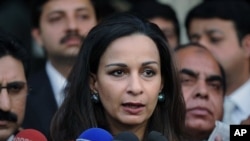Pakistan has named Sherry Rehman its new ambassador to the United States, less than 24 hours after the previous envoy, Hussain Haqqani, was ordered to resign in connection with what Pakistan’s media has widely labeled “memogate.”
Haqqani stepped down following claims he appealed for Washington's help in reining in Pakistan's powerful military.
|
Ambassador Akbar Ahmed, the former High Commissioner of Pakistan to Great Britain and now the Chair of Islamic studies at American University in Washington, DC told VOA's Ira Mellman that the removal of the US Ambassador reveals a deep split between Pakistan's government and it's military. |
He was ordered to resign the night before after a meeting with Pakistan’s president, prime minister, and chiefs of the country's security establishment.
Weeks earlier, a Pakistani-American businessman publicly accused Haqqani of writing an unsigned memo to the United States, seeking U.S. help to prevent a military coup in Pakistan following the American raid that killed former al-Qaida leader Osama bin Laden. The letter was sent in May to Admiral Mike Mullen, the top U.S. military official at the time.
Haqqani has denied any connection with the memo.
Rehman, a former journalist and Pakistani information minister, addressed the media Wednesday just hours after she was appointed as Pakistan's new ambassador to the United States. She sought Wednesday to downplay the memo’s impact.
She dismissed the notion that the episode has in any way undermined Pakistan’s relations with the United States, saying even Washington acknowledges it is an “internal affair” of Pakistan. As for her predecessor, she said he resigned honorably, to keep controversy from tarnishing Pakistan’s image.
Pakistan’s prime minister said Tuesday that Haqqani’s resignation was necessary to ensure a fair investigation of the memo controversy.
For critics of Pakistan’s ruling party, the document represents an unacceptable compromise of the country’s sovereignty.
In return for U.S. help in preventing a military coup in Pakistan, the memo said a new national security team would conduct a full inquiry into allegations that Pakistan harbored bin Laden. The new team would also hand over top al-Qaida members and ensure that Pakistan's military spy agency cuts ties to the Taliban, the Haqqani network and other groups.
Former cricket superstar Imran Khan, now a top opposition figure, says he believes responsibility for the memo reaches all the way up to the president.
Khan said it is clear Haqqani had to resign, adding that if the memo proves to be authentic, then it amounts to treason. He said he and his party are seeking a Supreme Court probe into the matter, because the government cannot be trusted to investigate itself.
The Pentagon says it never took the memo seriously, and was unconvinced it actually came from Haqqani. Independent Pakistani security analyst Hasan Askari Risvi said that may be because the memo’s promises were difficult to believe.
“Anybody who knows politics in Pakistan understands that no Pakistani government is in a position to fulfill those commitments," he said. "Civil government is too weak to really assert against the military on these points, which are very crucial for the way the military operates in Pakistan.”
The United States says it will offer whatever help it can in Pakistan’s investigation of the controversial memo.











